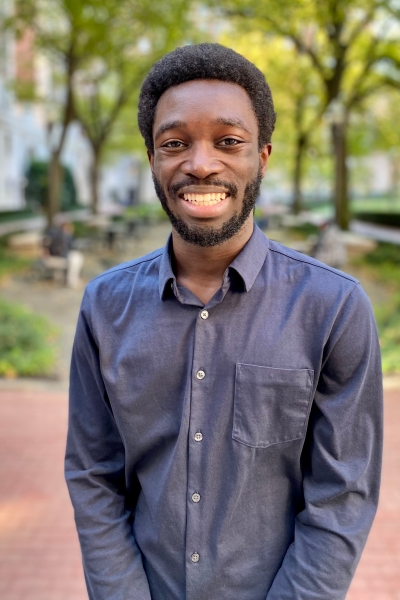
Emma Asher
Meet Simon Ogundare CC’24 (he/him), co-director of Nightline Peer Listening. The neuroscience behavior major, who grew up splitting time between England and Nigeria, wants to spread the word about Columbia’s anonymous peer listening service. Callers to Nightline can share whatever is on their minds with nonjudgmental, empathetic students who are trained to offer coping mechanisms and to refer callers to additional resources. Nightline is open 9 p.m.–2 a.m., and can be reached at 212-854-7777.
How did you get involved with Nightline Peer Listening?
When I was a freshman, we were still in the pandemic so it was challenging to get a sense of which student groups were available. Nightline stood out to me because I was looking to join the Columbia community but also be able to do some tangible good. And I also thought that it would put me a little outside of my comfort zone; it was just something that I gravitated to.
What do you wish that Columbia students knew about Nightline?
We have many mottos at Nightline, but one of my favorites is “No problem is too big or too small.” I think sometimes it can come across that students feel like they need to be in a very serious situation in order to call us, but students can call Nightline to talk about essentially anything on their minds, from having trouble falling asleep, to academic stress, to something relationship related — we’re here for all of that.
The other directors and I are also trying to prioritize a lot more outreach this year. And for us that often involves collaborating with other student groups on tabling or flyering or having workshops. We’re always open to new ideas on ways to promote and share resources, so if other student groups are interested in that, they should absolutely reach out to us.
What’s been your favorite thing about being involved in Nightline?
I’ve made very, very close friends. The community is full of people who have genuine commitment. And I think it really speaks to their character that a lot of them will never get recognition for the calls that they take and the things they do, because our listeners are anonymous.
What’s been your favorite class at Columbia, and why?
Last year I took a two-semester series, Neurobiology I and Neurobiology II. My first semester was taught by the head of the lab that I work in, so it was great to see him in that capacity. One of his priorities was finding ways for us to think as scientists; we would look at papers and ask, “Why was this choice made or that choice made?” And I think that helped to make what can feel like a ton of content to learn feel very intuitive, so I appreciated that. But I think more generally, across both semesters, the professors were very excited about the work that they do, and you felt that as they were lecturing. So even though there was a lot of content and there’s a lot on your plate, it was enjoyable going to the lectures and hearing from professors who’ve dedicated their lives to this work.
What do you like to do outside of class?
I’m in the Columbia Neuroscience Society; it’s a great opportunity to do a lot of science communication and outreach. We hold conferences every year, and we have a lot of very, very driven members.
How do you like to take advantage of being in New York City?
I created a running list of restaurants with one of my friends and we’re trying to cross off as many as we can for trying different cuisines! Apart from that, one of my favorite places in New York is Riverside Park, specifically the Hudson River Greenway that goes from almost the top of Manhattan all the way to Battery Park. I love biking or running or just walking down there by the water.